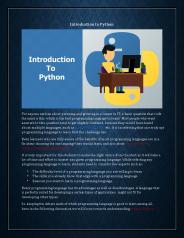Python Introduction - PowerPoint PPT Presentation
Title:
Python Introduction
Description:
About the CompanyPython was created by Guido vanRossum and first released in 1991.It is an open-sourcelanguage, meaning its source code is freely available andcan be modified and distributed. – PowerPoint PPT presentation
Number of Views:1
Title: Python Introduction
1
Python
ADD COMPANY NAME
Introduction Whttps//nareshit.com/python-online-t
raining
2
Introduction
About the CompanyPython was created by Guido van
Rossum and first released in 1991.It is an
open-source language, meaning its source code is
freely available and can be modified and
distributed.Python is widely used across various
domains, including web development, data
science, artificial intelligence, scientific
computing, automation, and more
3
Key Features
Easy to Learn and Read Python emphasizes
readability and simplicity, making it an ideal
language for beginners. Expressive Syntax
Python code is concise and expressive, allowing
developers to write code in fewer lines compared
to other languages. Interpreted and Interactive
Python code is executed line by line by the
Python interpreter, enabling interactive
development and debugging. High-level Language
Python abstracts low-level details, making it
easier for developers to focus on solving
problems rather than managing memory or hardware.
4
Common Applications
Data Science and Machine Learning Libraries
like NumPy, pandas, TensorFlow, and PyTorch are
widely used for data analysis, machine
learning, and artificial intelligence.
WebDevelopment Frameworks like Django and Flask
are popular for building web applications.
https//nareshit.com/python-online-training
5
Scientific Computing
Automation and Scripting Python's simplicity and
versatility make it an excellent choice for
writing scripts to automate tasks.
Python is used extensively in scientific
computing and research, with libraries like
SciPy and Matplotlib.
6
Python Versions
- Python has two major versions Python 2 and
Python 3. - Python 2 was the legacy version, but it reached
its end of life on January 1, 2020, and is no
longer maintained. - Python 3 is the current version and has seen
widespread adoption. It introduced several
improvements and backward-incompatible changes
from Python 2.
7
Thank you
https//nareshit.com/python-online-training
91 8179191999 www.nareshit.com































